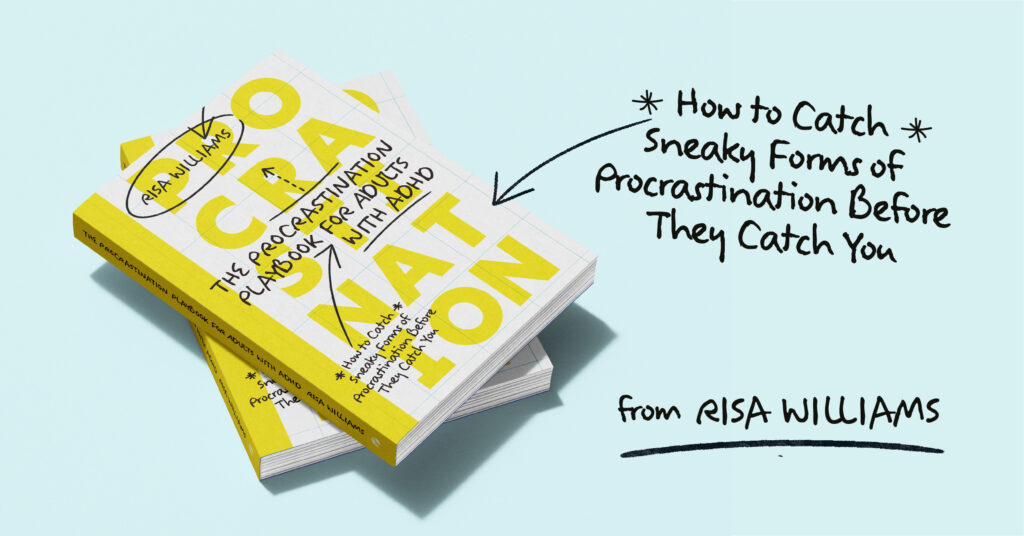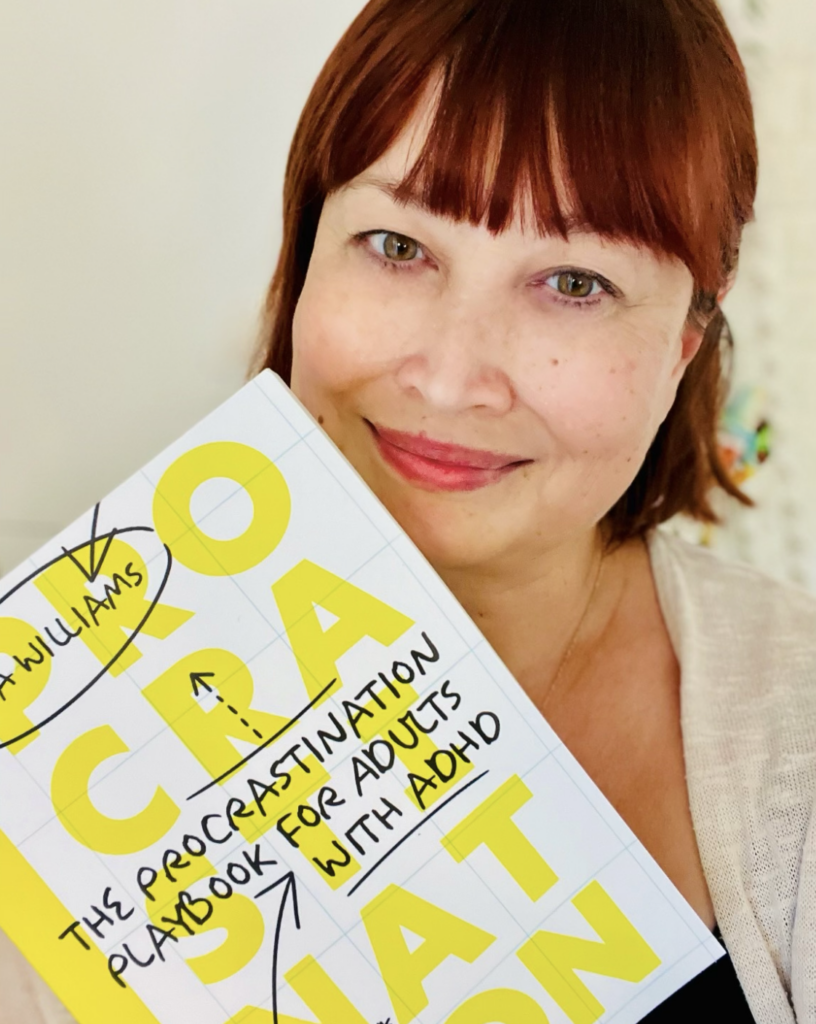Holiday Procrastination and What You Can Do About It

By Risa Williams, author of The Procrastination Playbook for Adults with ADHD: How to Catch Sneaky Forms of Procrastination Before They Catch You
With the holidays approaching, it’s a time of year when many people find themselves stuck in one form of procrastination or another. Do you put off buying presents, answering invites, or ordering stuff for upcoming events? Or, do you sometimes find yourself rushing around from one task to the next, staying overly busy, while still avoiding doing the one task you actually need to finish by today?
We don’t always procrastinate things we don’t like doing, either. Sometimes, we procrastinate things we really enjoy doing, too! Are you putting off making holiday plans to meet good friends you actually like seeing? Many of us might even be procrastinating taking that much-needed vacation, going to that festive get together, or starting new creative projects we want to do.
Just to normalize this, everyone procrastinates. Big things, little things, everyday things – people find all sorts of different ways to avoid doing things they both need and want to do.
Macro and Micro Procrastinations
A lot of people aren’t just procrastinating big things right now such as changing jobs, finishing huge projects, moving to new cities, completing degrees, or tackling large-scale tasks. I call these macro-procrastinations and they tend to happen in big doses across longer stretches of time.
There are also micro-procrastinations that we tend to do more regularly. Micro-
procrastinations are smaller everyday things that we tend to put off doing, for example: returning emails, scheduling appointments, doing laundry, organizing rooms, exercising, starting a new habit, flossing teeth, drinking enough water, finishing reading a book, or even texting people back.
Often, people will feel more guilt and shame about micro-procrastinations than they do about macro-procrastinations because they feel like, “Everyone else can do these daily things, what’s wrong with me?” or “Why are these little things so hard for me to do each week?”
Our executive functions can influence whether or not we are prone to chronically procrastinate. Executive functioning is a set of brain functions related to working memory, our ability to sustain focus, our ability to prioritize tasks, follow directions, and regulate our emotions and stress levels. In a study done in 2021, researchers found that students who reported executive functioning difficulties, also had high levels of procrastination (Rinaldi, AR, 2021).
When we begin to mindfully observe our own procrastination tendencies in a non-judgmental way, and begin to show ourselves more regular compassion, we can start to tap into our executive functions again and decide what to do next.
The Procrastination Cues
While some forms of procrastination are very easy to catch yourself doing, other subtle forms of procrastination can sneak up on us throughout everyday life. Unless we’ve trained ourselves to become more aware of our internal “procrastination cues,” we might not realize how avoidant we’ve become to doing certain tasks until the procrastination has fully set in.
What are some subtle signs that you might be starting to procrastinate? We all have internal and external cues that tell us that we might be avoiding doing a task. What do your own procrastination warning signs look like?
Since everyone behaves in different ways when they are procrastinating, these procrastination warning signs will look different for each person.
Here are different examples from clients:
- “I start binge-watching Netflix shows but I can’t really focus on watching them and they don’t feel fun. Even so, I keep clicking on the next episode anyway, even though I feel really bad about it and I can’t enjoy it.”
- “I don’t open my mail when I am avoiding multiple things. The pile of mail gets bigger and bigger, the more I am avoiding things.”
- “When there is work I am avoiding doing, I buy clothes online. I start impulse shopping way too much online and make lots of questionable purchases that I feel bad about.”
- “I get distracted cleaning the house instead of finishing what I need to do. I get a lot of cleaning done and I don’t do anything else. Avoidance-cleaning, I call it.”
- “I spend way too much time scrolling on my phone and I start to lose track of time a lot. But I feel guilty the whole time I’m doing it and it often gives me headaches.”
- “I forget lots of little things, I start to overbook my schedule and I get overly busy. I rush around from one thing to the next. I think I get busier on purpose to avoid doing the one thing I don’t want to do.”
It can be helpful to start to keep a list of possible “procrastination warning signs” as they appear and then begin to notice them more intentionally throughout everyday life.
As you start to become more pro-active about noticing procrastination as it appears, you can start to apply a general strategy for getting yourself un-stuck again:
–CALL IT OUT (Notice the warning signs as they appear and label them to yourself)
–PLAN IT OUT (Write out the task you’re avoiding and form a clear plan of action)
-TAKE ACTION (Decide to move and take the very easiest first step forward)
Learning about your procrastination tendencies can help you become more a pro-active procrastination catcher so you can start to catch procrastination before it catches you.
For more tools and 30 practical worksheets you can use with clients, read: The Procrastination Playbook for Adults with ADHD: How to Catch Sneaky Forms of Procrastination Before They Catch You by Risa Williams, (Jessica Kingsley Books), which you can purchase at:

Risa Williams is a licensed therapist, a time management specialist and an award-winning book author. Her five self-help books include: Get Stuff Done Without the Stress (Mango Books), The Procrastination Playbook, The Ultimate Anxiety Toolkit, The Ultimate Time Management Toolkit and The Ultimate Self-Esteem Toolkit (JKP Books). She’s also the host of The Motivation Mindset Podcast (Apple, Spotify). Risa has been featured as an expert in Forbes Magazine, Women’s World, HuffPost, Business Insider and Wired Magazine. She’s also a mom of two and a psychology professor. Learn more at risawilliams.com and at @risawilliamstherapy